Worms (worms) are parasitic worms that invade the human body and harm your health, and the diseases they cause are helminthiasis. More than 300 species of these parasites have now been identified. Helminth infections are widespread, but mainly in areas with warm and humid climates. The risk group includes children aged 5-15. They often have roundworms and roundworms. This is explained by children's desire to learn about the outside world, low immunity to helminths, and insufficient acidity of gastric juice. The main habitat of helminths is the intestines.
They enter the human body through skin tissue when eggs and worm larvae are swallowed with water and food. Mature eggs develop into larvae in the digestive tract. They enter the bloodstream through the intestinal lining and travel to the liver, gall bladder, bronchi, lungs, heart and brain. When coughing up sputum and swallowing saliva, the worms enter the person's intestines again. There they will be able to reproduce after 70-75 days.
It takes up to 3 months from damage caused by eggs or larvae to the appearance of mature helminths - in the early stages of the disease. From the moment the adult is formed, the late stage begins. Worms in the human body live in the intestines for up to a year, and there they lay their eggs, which are released into the environment by defecation.
Types of worms
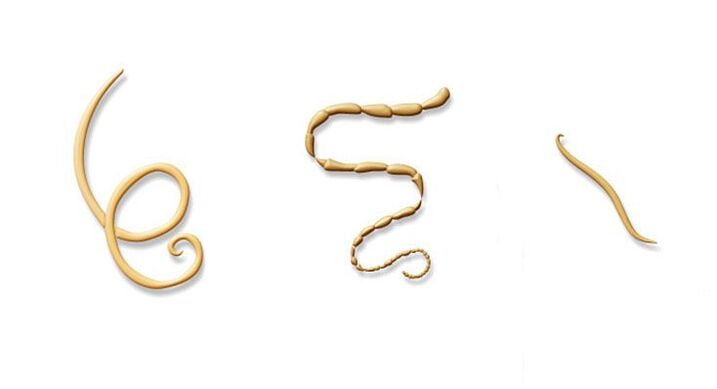
There are several types of worms:
- Roundworms (nematodes) - roundworms, hookworms, roundworms, whipworms.
- Tapeworms (cestodes) - pig tapeworm, broad tapeworm.
- Flukes (trematodes) - lung and liver fluke, cat fluke.
In addition, helminthiasis differs in the characteristics of development and infection:
Geohelminthiasis. Parasite eggs are found in the soil and enter the human body through unwashed fruit and poor personal hygiene.
Biohelminthiasis. These types of worms have an intermediate host - dogs, fish and shellfish. The defeat of humans, who are considered the final hosts of parasites, is associated with the consumption of low-quality fish or contact with animals.
Causes of worms in humans
Worm eggs are often brought into the house on the paws and fur of pets that are walked or let loose outside. The most common cause of helminthiasis is violation of personal hygiene rules. For example, a person forgot to wash his hands after leaving the house, using the toilet or before eating.
The risk of helminthiasis increases if you have a habit of sucking your fingers, biting your nails, or holding a pen or pencil in your mouth.
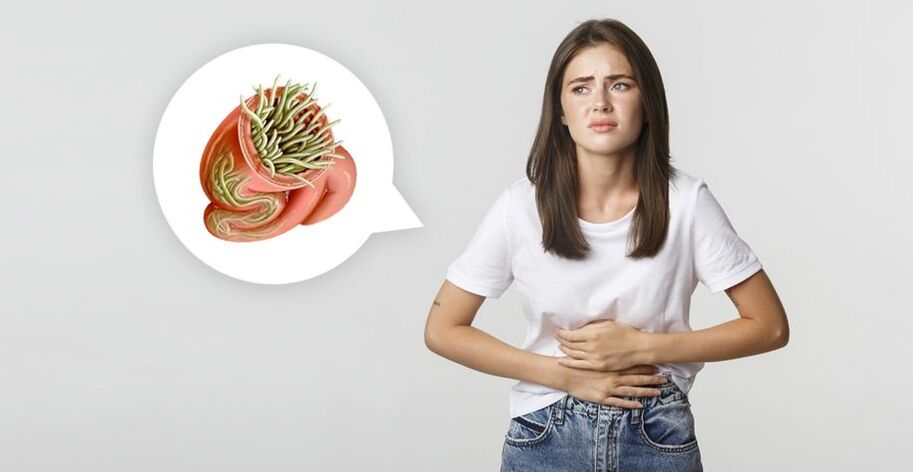
Poor quality washing of plant products causes great harm to health.
Helminthiasis can occur if you drink raw water, as well as wash food with water from an untested source.
The cause of helminthiasis can be fish or meat, if the preparation technology is violated. If beef is not cooked properly, it can become infected with cattle tapeworm, if fish is poorly processed, then infection with broad tapeworm is possible; if pork is not cooked, there is a high risk of infection with pork tapeworm.
Indoor worms can also occur if it is rarely wet cleaned and people walk on it without taking off their outer shoes.
Helminthiasis can be transmitted from a sick person through bedding, dishes or through close contact.
The causes of diseases are related to violations of hygiene rules, poor care of domestic cats and dogs, and poor food hygiene. If you exclude these factors, then the probability of infection with helminths is minimal.
Signs of worms in humans
Helminthiasis is acute and chronic. The former leads to an allergic reaction. The patient's complaints show signs of allergy and poisoning:
- weakness and fatigue;
- skin rash and itching;
- shortness of breath;
- cough without phlegm;
- enlarged lymph nodes;
- increased gas formation in the intestines.

In the case of chronic infection with worms, the manifestations are varied and are related to the location of the worms, their number and the characteristics of the human body's response immunity. The most common symptoms of worms are:
- weakness, increased fatigue;
- increased body temperature;
- darkening of the skin under the eyes;
- hives;
- appetite disorders;
- nausea, vomiting;
- bad breath;
- pain in the abdomen;
- diarrhea or constipation;
- weight loss;
- perianal itching;
- presence of worm pieces in the stool.
In addition, there may be disturbances in the functioning of organs affected by helminths. For example, if the parasites are in the liver or gall bladder, pain in the right hypochondrium, nausea and yellowing of the skin are typical. If the helminths have penetrated the lungs, bronchitis and suffocation are possible. Roundworms can cause myocarditis and heart failure. Children who are repeatedly diagnosed with worms often suffer from ARVI, stomatitis, gingivitis, and girls suffer from vulvovaginitis.
A characteristic symptom is bruxism (grinding teeth at night). In case of helminthiasis, the nervous system suffers - a person experiences increased irritability, concentration difficulties, reduced physical activity and sleep disturbances.
Against the background of worms in the body, the immune defense weakens, so fungal and pustular skin diseases, caries occur, and allergies and accompanying diseases are more serious.
If helminthiasis is not treated immediately, the larvae of the parasite damage blood vessels, intestines and all vital organs. This affects the patient's condition and well-being.
The products that the larvae secrete during their life poison the human body. They cause local allergy, urticaria, bronchial asthma and atopic dermatitis.
Worms feed on the proteins, minerals and vitamins of the human body. In children, this can cause developmental delays. Hookworms and whipworms feed on the blood of the host, i. e. humans, and cause anemia.
In the case of massive reproduction of worms in the human body, it is possible to disrupt the intestinal microflora and incompletely close the lumen of the intestines and bile ducts. It is a possible cause of appendicitis, cholecystitis and intestinal obstruction.
When should you go to the doctor?
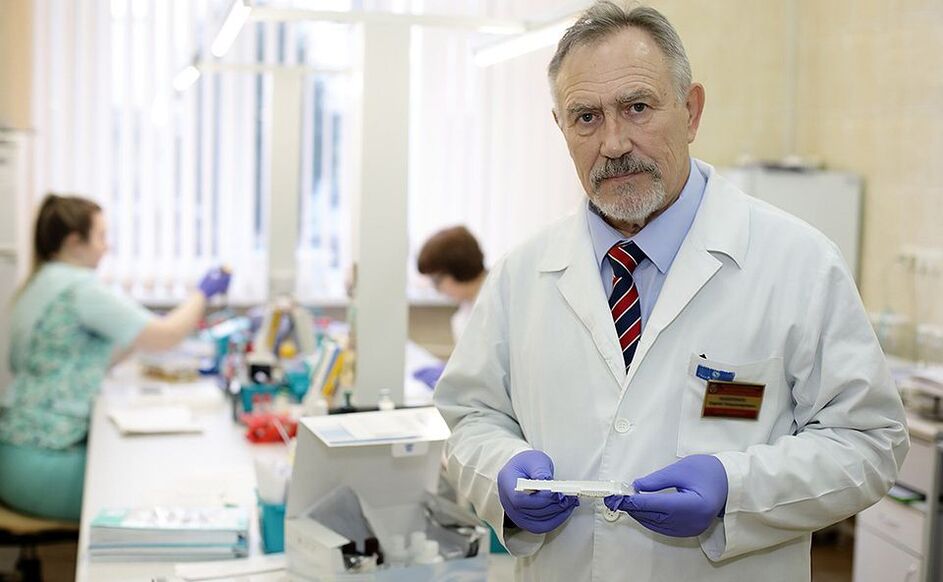
Helminthiasis should be treated immediately. In the human body, worms interfere with the absorption of nutrients in the intestines. They select foods that are harmful to the digestive system. Without treatment, the worms can invade the brain, lungs, and other organs.
We recommend that you consult a qualified gastroenterologist if you notice the following pathological symptoms:
- lethargy, malaise;
- allergic reactions, such as skin rash, bronchial asthma;
- a person eats a lot or little;
- nausea and vomiting occur, but there are no signs of poisoning;
- diarrhea, constipation;
- weight loss with good appetite;
- poor sleep;
- rise in body temperature;
- muscle and joint pain without physical activity;
- enlargement and inflammation of the lymph nodes;
- bruxism;
- worms in the stool;
- itching in the perianal area.
If a worm infection is suspected, the liver, spleen and lymph nodes can be felt. The listed organs can be enlarged.
In case of helminthiasis, the general blood test shows leukocytosis, eosinophilia and increased ESR.
Helminthic diseases can be detected most accurately 3 months after the onset, when the helminths become sexually mature individuals. In order to establish a diagnosis and check the effectiveness of therapy, laboratory tests are prescribed:
- perianal scraping for pinworm eggs;
- stool analysis for worm eggs;
- co-program.
Sputum, urine, vomit, duodenal contents and pieces of skin are used as material for examination and diagnosis.
Allergy tests are performed to identify diseases of intestinal worms. Changes in internal organs are detected with the help of:
- X-ray of the lungs.
- Ultrasound examination of the liver.
- Computed tomography of internal organs.
- Colonoscopy.
- Esophagogastroscopy.
Sometimes it is not easy to identify helminthiasis in people, because worms lay eggs irregularly. For their detection, it is important to take material for research during the breeding season of the worms. Antibodies against worms can be detected in the blood 2 months after infection. They are then not detectable in the bloodstream, but accumulate in the intestinal wall. Diagnosis is also difficult due to the variety of clinical symptoms. Often, specialists prescribe research and treatment based on indirect symptoms of helminthiasis.
Folk remedies against parasites
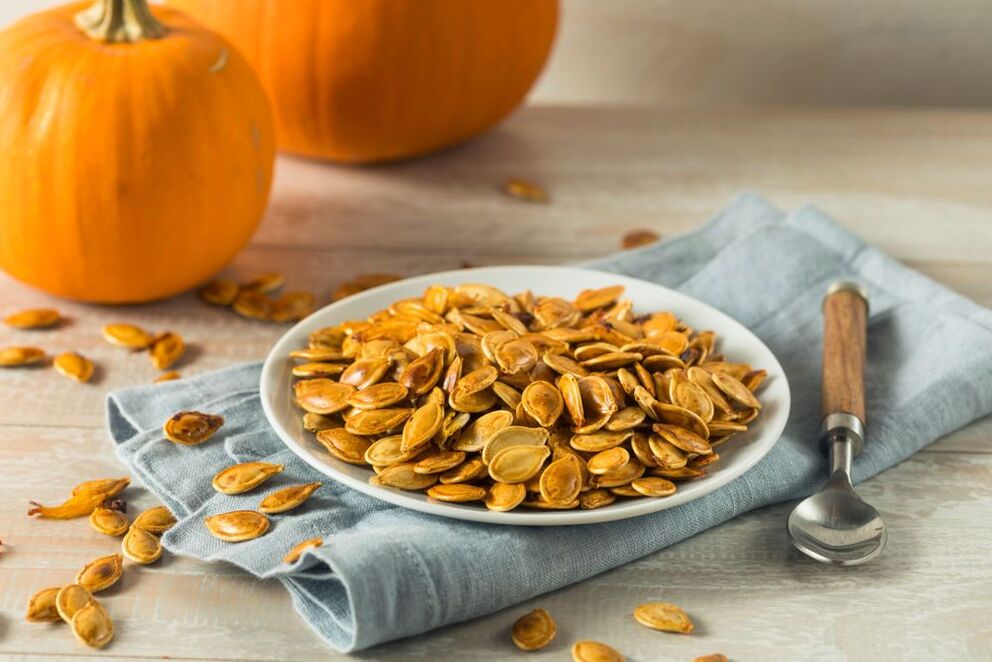
Pumpkin seeds are a widely known folk method for treating worms. This product is suitable for children and adults. This product contains cucurbitins, which negatively affect the vital activity of helminths. However, pumpkin seeds cannot completely cure parasites. If you don't see a doctor or get tested, complications can occur because the worms multiply quickly. They are especially dangerous if they affect the internal organs and the brain.
How to get rid of worms - traditional medicine can be used in addition to the treatment prescribed by the doctor.
Tansy infusion
Empty infusion
To prepare the infusion, grind the dried wormwood in a coffee grinder. Then pour 2 teaspoons of plant material into 300 ml of boiling water and let it stand for 6-8 hours in a thermos. Then the infusion must be filtered. Take 100 ml in the morning before meals for 2-3 weeks. The product is stored in the refrigerator for up to 2 days.
Infusion of cloves. This spice is widely used in folk medicine. The dried buds of this plant enhance the functioning of the gastrointestinal tract, normalize digestion and increase immunity. Clove infusion is effective against worms.
To prepare, pour 500 ml of water into 30 g of buds and wait until the product cools completely. Take 1 glass orally before breakfast.
Tincture of cloves. Pour 30 g of buds into 500 ml of vodka (alcohol). The liquid is infused in the dark for 2-3 weeks and then filtered. Take 1 teaspoon of tincture before meals for 2-4 weeks.
Prevention
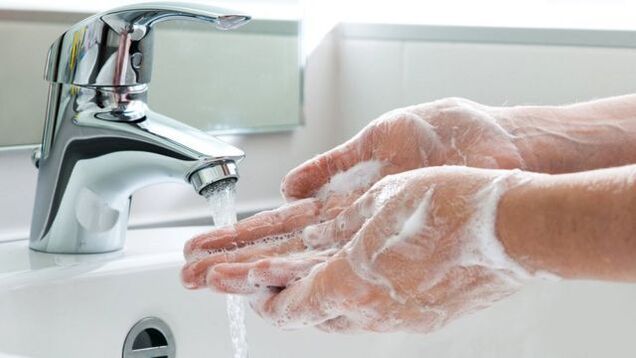
In order to prevent worms in adults, it is important to follow personal hygiene rules. They should also be instilled in children from the first years of life. These rules include:
- Wash your hands with soap before going outside, handling animals, using the toilet and eating.
- Rinse fruits and herbs thoroughly with water, then rinse with boiling water.
- Fish and seafood must be thermally processed for a long time.
- Use good quality and safe water for domestic purposes.
- You must use hygiene products, individual dishes, towels and bed linen.
- You can use boiled, filtered water for drinking.
- Indoors, regularly wipe surfaces with a damp cloth and wash the floor.
- The floor must be washed with detergent once every 2 weeks.
Removal of worms - in spring and autumn, it is recommended to prevent helminthiasis with broad-spectrum anthelmintic agents. Pets must be regularly dewormed.
Worms are transmitted - if the rules of personal hygiene and prevention of helminthiasis are violated, all members of the family can become infected.






































